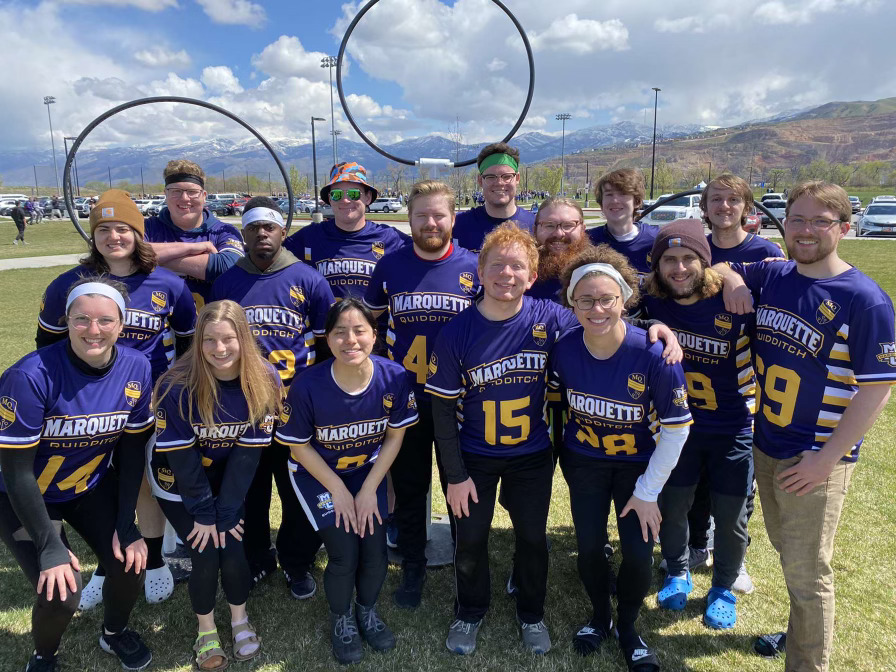Quidditch, a sport created from JK Rowling’s fictional “Harry Potter” universe, has a new name.
“I absolutely hate it,” first-year law student Haley George said. “There was an option, Quidstrike … I liked Quidstrike because it is still related to Quidditch, but it’s not completely changing the entire name of the sport.”
Now known as United States Quadball, the sport changed its name over the summer removing any association with Rowling. The name change came after Rowling became increasingly criticized for her anti-transgender positions.
The club has emphasized referring to the sport as Quidditch, not Quadball, for as long as possible. The club said it is not due to transphobia or agreeing with Rowling, but to eliminate confusion amongst members.
“Having the name Quidditch doesn’t mean the sport is transphobic, in fact it’s a really LGBT+ friendly sport that allows players to choose their gender identity,” George said. “The reason why we aren’t changing the name isn’t due to transphobia, but copyright issues.”
The club attracts members that are more than just “Harry Potter” fans like Kennedy Moore, a senior in the College of Arts & Sciences.
“One of my coworkers recommended it to me and my friend,” Moore said. “Then we saw him at O-Fest again, signed up, went to the practice and I actually thought it was very fun.”
He said that along with the sport being fun, the camaraderie and tight-knight bond with his teammates made him stick with the sport.
Moore said the team mainly plays other schools across the Midwest, but also teams from all around the nation. They have played Bowling Green, Columbia College and Boston University.
He said the sport is a mix of rugby, dodgeball and basketball all mixed into one.
“Rugby is full contact, so you’re actually tackling each other. It’s dodgeball because you have to throw the ball at a person and they have to catch it as well. Then it’s basketball because you’re trying to get a ball in a hoop and you can dunk,” Moore said.
Quadball has four positions, chasers, beaters, seekers, keepers, and four balls, three bludgers and one quaffle.
“Chasers wear white headbands on the field, and they pass the volleyball around or try to drive the volleyball into one of three hoops on the opposing side,” Alek Giecewicz, a second-year Law School student, said. “Beaters are more of a supporting position because our responsibility is to play with the dodgeballs and try to if we are offense, open up a path to the hoop by hitting people with the dodgeball, or when we’re on defense, it’s our job to stop the opposing play.”
There is also a tennis ball stuffed into a golden sock, which is called a golden snitch.
Seekers try to get the golden snitch, which is brought into the game at the 20-minute mark and is worth 35 points. Keepers guard their three hoops and try to stop the other team from scoring.
Giecewicz said while quadball may not normally be associated with extreme physicality, the sport is intense.
“It is a full contact sport, so tackling is involved, unfortunately, it can lead to certain injuries,” Giecewicz said. “Keepers have a tendency to get more injured than others because sometimes a ball will be on the ground and it is the keeper’s responsibility to essentially dive at it.”
The team finished last season strong, securing first place in their division at nationals. This year, the team is heading into the season with a different goal.
“What I would say is reestablishing our foundations and self-growth because we will be mostly made up of new members,” George said.
In a previous version of this story it incorrectly stated that the tennis ball that is stuffed into a golden sock is called a golden snitch. In accordance with the latest version of the United States Quadball rulebook, it is referred to as “the flag.”
This story was written by Jack Albright. He can be reached at jack.albright@marquette.edu or on Twitter @JackAlbrightSJ.




